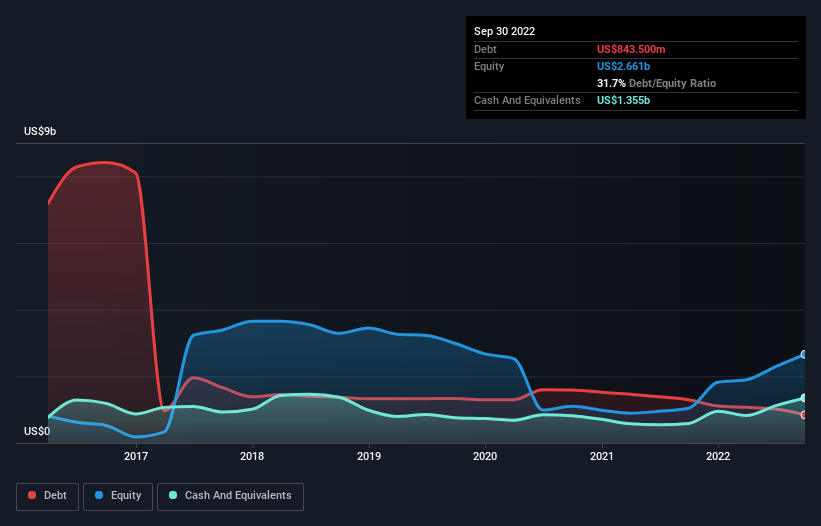
David Iben put it well when he said, 'Volatility is not a risk we care about. What we care about is avoiding the permanent loss of capital.' It's only natural to consider a company's balance sheet when you examine how risky it is, since debt is often involved when a business collapses. We note that Peabody Energy Corporation (NYSE:BTU) does have debt on its balance sheet. But should shareholders be worried about its use of debt?
When Is Debt A Problem?
Debt is a tool to help businesses grow, but if a business is incapable of paying off its lenders, then it exists at their mercy. Part and parcel of capitalism is the process of 'creative destruction' where failed businesses are mercilessly liquidated by their bankers. However, a more usual (but still expensive) situation is where a company must dilute shareholders at a cheap share price simply to get debt under control. Of course, plenty of companies use debt to fund growth, without any negative consequences. The first thing to do when considering how much debt a business uses is to look at its cash and debt together.
See our latest analysis for Peabody Energy
What Is Peabody Energy's Net Debt?
You can click the graphic below for the historical numbers, but it shows that Peabody Energy had US$843.5m of debt in September 2022, down from US$1.30b, one year before. But it also has US$1.35b in cash to offset that, meaning it has US$511.0m net cash.

How Strong Is Peabody Energy's Balance Sheet?
We can see from the most recent balance sheet that Peabody Energy had liabilities of US$1.32b falling due within a year, and liabilities of US$1.45b due beyond that. Offsetting this, it had US$1.35b in cash and US$426.4m in receivables that were due within 12 months. So its liabilities total US$988.9m more than the combination of its cash and short-term receivables.
While this might seem like a lot, it is not so bad since Peabody Energy has a market capitalization of US$3.80b, and so it could probably strengthen its balance sheet by raising capital if it needed to. But it's clear that we should definitely closely examine whether it can manage its debt without dilution. While it does have liabilities worth noting, Peabody Energy also has more cash than debt, so we're pretty confident it can manage its debt safely.
It was also good to see that despite losing money on the EBIT line last year, Peabody Energy turned things around in the last 12 months, delivering and EBIT of US$1.2b. There's no doubt that we learn most about debt from the balance sheet. But it is future earnings, more than anything, that will determine Peabody Energy's ability to maintain a healthy balance sheet going forward. So if you're focused on the future you can check out this free report showing analyst profit forecasts.
But our final consideration is also important, because a company cannot pay debt with paper profits; it needs cold hard cash. While Peabody Energy has net cash on its balance sheet, it's still worth taking a look at its ability to convert earnings before interest and tax (EBIT) to free cash flow, to help us understand how quickly it is building (or eroding) that cash balance. During the last year, Peabody Energy produced sturdy free cash flow equating to 67% of its EBIT, about what we'd expect. This free cash flow puts the company in a good position to pay down debt, when appropriate.
Summing Up
While Peabody Energy does have more liabilities than liquid assets, it also has net cash of US$511.0m. The cherry on top was that in converted 67% of that EBIT to free cash flow, bringing in US$779m. So we don't have any problem with Peabody Energy's use of debt. There's no doubt that we learn most about debt from the balance sheet. But ultimately, every company can contain risks that exist outside of the balance sheet. For instance, we've identified 4 warning signs for Peabody Energy (2 are potentially serious) you should be aware of.
Of course, if you're the type of investor who prefers buying stocks without the burden of debt, then don't hesitate to discover our exclusive list of net cash growth stocks, today.
If you're looking to trade Peabody Energy, open an account with the lowest-cost platform trusted by professionals, Interactive Brokers.
With clients in over 200 countries and territories, and access to 160 markets, IBKR lets you trade stocks, options, futures, forex, bonds and funds from a single integrated account.
Enjoy no hidden fees, no account minimums, and FX conversion rates as low as 0.03%, far better than what most brokers offer.
Sponsored ContentNew: Manage All Your Stock Portfolios in One Place
We've created the ultimate portfolio companion for stock investors, and it's free.
• Connect an unlimited number of Portfolios and see your total in one currency
• Be alerted to new Warning Signs or Risks via email or mobile
• Track the Fair Value of your stocks
Have feedback on this article? Concerned about the content? Get in touch with us directly. Alternatively, email editorial-team (at) simplywallst.com.
This article by Simply Wall St is general in nature. We provide commentary based on historical data and analyst forecasts only using an unbiased methodology and our articles are not intended to be financial advice. It does not constitute a recommendation to buy or sell any stock, and does not take account of your objectives, or your financial situation. We aim to bring you long-term focused analysis driven by fundamental data. Note that our analysis may not factor in the latest price-sensitive company announcements or qualitative material. Simply Wall St has no position in any stocks mentioned.
About NYSE:BTU
Very undervalued with flawless balance sheet.
Market Insights
Community Narratives



